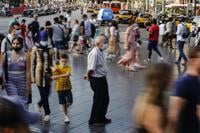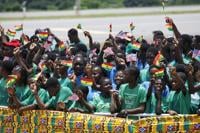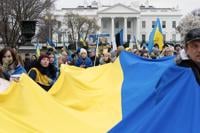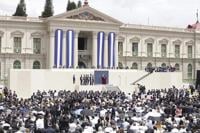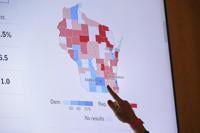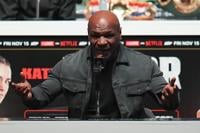The Paris Olympics involve about 10,500 athletes from 200 countries or regions. But the Olympics are more than just fun and games.
They are a giant business that generates billions of dollars in income for the International Olympic Committee. They're also a proxy for geopolitical influence seen through the standings in the medal tables, the presence of world leaders at the opening ceremony and the national anthems serenading gold-medal winners.
Here's a look at how the IOC and the Olympics operate.
It's a business, not a charity
The International Olympic Committee is a not-for-profit, nongovernmental body based in Lausanne, Switzerland. It generates 91% of its income from selling broadcast rights (61%) and sponsorships (30%). Income for the latest four-year cycle of Winter and Summer Games ending with the Tokyo Olympics in 2021 was $7.6 billion. The IOC says it returns 90% of its income back into sports, although athletes directly get only a small slice. to change that. The IOC opened a new headquarters in 2019 at a reported cost of about 190 million Swiss francs, or about $200 million. Host nations pick up the majority of the bills for staging the Olympics. was officially listed at $13 billion. More than half was covered by Japanese government entities. Olympic costs are difficult to track, but a Japanese government audit suggested the real costs may have been twice as much as listed.
Membership and perks
The IOC is composed of about 100 members. The membership selects its own colleagues and the longest serving is Princess Nora of Liechtenstein. At least a half-dozen other royals are IOC members. However, most of the power is vested in President Thomas Bach — a lawyer from Germany who also is a member — and his executive board. IOC members are technically volunteers, though all of Bach's expenses are covered by the IOC. The IOC's annual report says this amounted to $370,000 in 2022. This included an annual “indemnity” of 275,000 euros, or about $295,000. His tax liabilities of $163,000 in Switzerland also were paid. IOC members receive per diems of between $450-900 to attend meetings and get first-class travel and five-star lodging.
Unpaid volunteers
Unpaid volunteers help the IOC and local organizers run the Games. They typically receive uniforms, food when they work and some minor transport costs. Lodging is seldom included. Paris is looking for 45,000 volunteers. Tokyo initially went after 80,000. Typically, only the well off can volunteer. The 2016 Olympics in Rio de Janeiro struggled to find volunteers because many of the city's poor could not work for free. Some showed up the first day, collected their uniforms and did not return. The volunteer system can be viewed as If volunteers were paid a minimum wage of $10 per hour, the extra cost could be as much as $100 million. not to show up to express their displeasure over Olympic spending and French pension reforms.
Sports and politics mix
The IOC says the Olympics transcend politics. But in reality, they are highly political. It's noteworthy that the IOC has observer status at the United Nations, indicative of its self-perceived role in the world. Political scientist Jules Boykoff notes in his recent book “What Are The Olympics For" that athletes march in the opening ceremony by country. They could just as well, he notes, march grouped by sports. But that would downplay the nationalist element, a key to the Games' popularity. Adolf Hitler used the 1936 to promote his agenda. The has its origins in Berlin.
Bids and are they worth it?
The IOC used to award the Games seven years in advance. In 2015, as it was set to award the 2022 Winter Olympics, the IOC had only two unlikely candidates: Beijing and Almaty, Kazakhstan. China's capital won in a close vote. , Germany and Switzerland dropped out because of high costs. Since then, the IOC has eliminated the old bid system. It had only two bidders in 2017 for the 2024 Summer Games: Paris and Los Angeles. It awarded Paris those Games and gave . In 2021, it awarded Brisbane, Australia, the 2032 Games — 11 years in advance — largely because of influential IOC member John Coates. by Victor Matheson and Robert Baade, two American college professors, concluded that “in most cases the Olympics are a money-losing proposition for host cities.” The study in the Journal of Economic Perspectives was published in 2016 and IOC officials say recent changes to the bid system will help. A key argument is that the and may bump aside priorities like schools and hospitals.
Scandals and corruption
The Olympics frequently have been embroiled in scandals or corruption, perhaps due to the large amount of public money involved and rushed deadlines. involved a bribery scandal over contracts, sponsorships and the bid itself. The 2016 were out of money when they opened. Then-IOC member , who headed the Games, was arrested on corruption charges shortly the Olympics were over. The 2014 Winter Games in Sochi, Russia, were marked by a state-run Corruption in the bid process in the 2002 Salt Lake Winter Games forced some ethics reforms. And organizers of the 1998 Nagano Winter Olympics in Japan are widely reported to have destroyed incriminating financial records that showed they spent millions on lavish entertainment for IOC members.
___
AP Olympics coverage:






